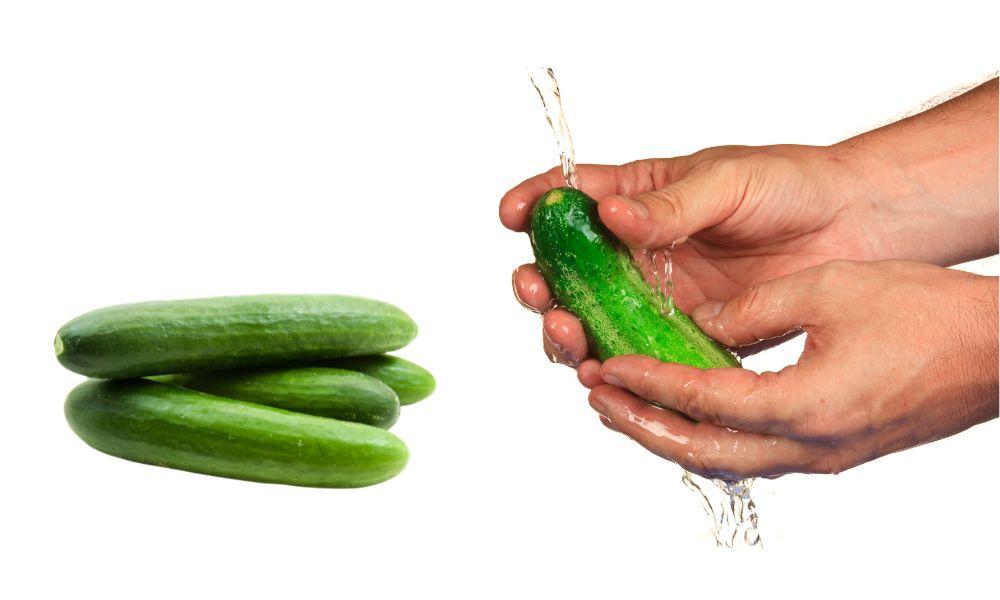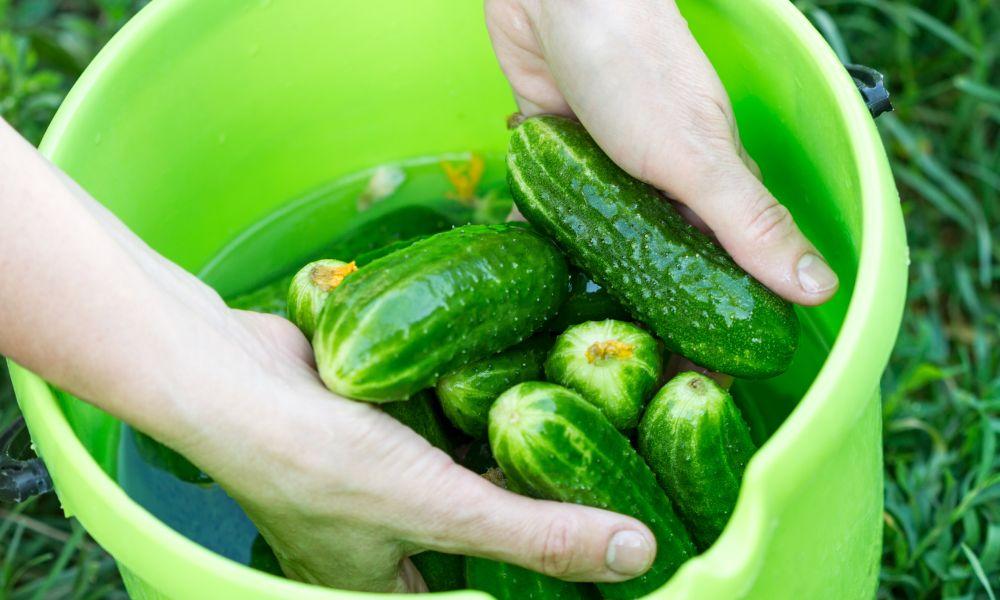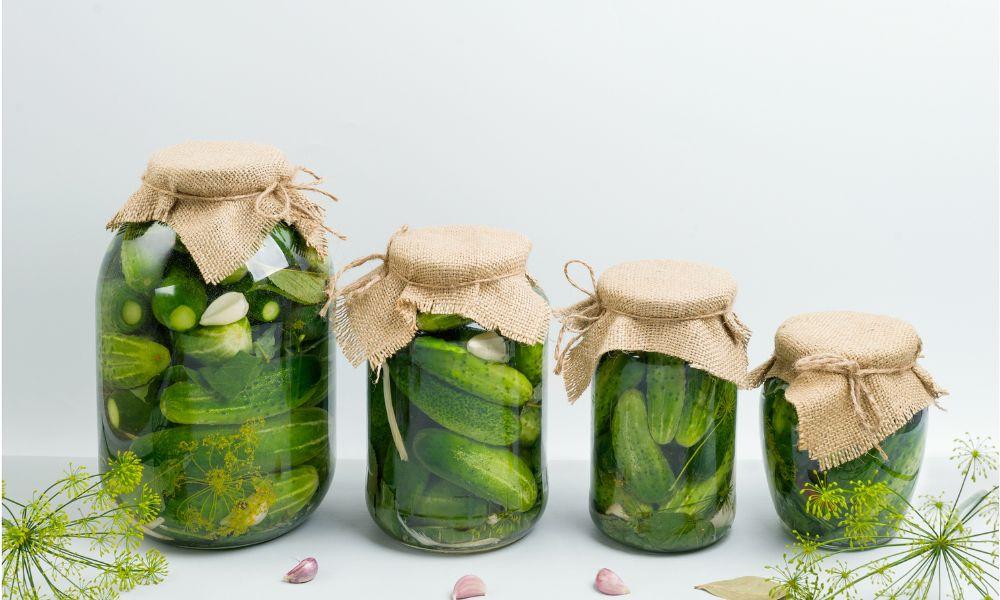Are you tired of watching your cucumbers wilt away on the kitchen counter, only to be thrown in the trash? Say hello to fresh, crunchy cucumbers all week long with our comprehensive guide on how to store cucumbers in the fridge!
Discover the secrets to maintaining cucumber freshness, the perfect temperature settings, and innovative storage methods to savor the delightful crunch of cucumbers whenever you please.

Why Store Cucumbers in the Fridge?
Have you ever left cucumbers on the counter, only to find them wilted and lifeless in a few days? The main reason behind this is that cucumbers are composed of about 96% water, which makes their freshness and quality highly susceptible to the surrounding environment. Keeping cucumbers at room temperature for an extended period allows the moisture to evaporate, leading to a loss of their crunchiness and overall flavor.
Here comes the fridge to the rescue! Not only does refrigeration slow down the evaporation process, but it also prevents cucumbers from ripening too quickly and reduces the risk of spoilage due to bacterial growth. Storing cucumbers in the fridge helps maintain their desirable texture and taste for a longer period, allowing you to enjoy the refreshing crunch in your salads and recipes.
Preparing Cucumbers for Refrigeration

Before you go ahead and toss your cucumbers into the fridge, there are a few preparation steps that can help prolong their shelf life even further:
1. Washing Cucumbers
While it might be tempting to wash your cucumbers as soon as you bring them home, it’s best to rinse them just before using them in your meals. Washing ahead of time can introduce excess moisture that may cause the cucumbers to spoil faster. However, if you still prefer washing cucumbers before storage, make sure to pat them completely dry with a clean towel to eliminate any lingering moisture.
2. Removing Plastic Packaging
Cucumbers usually come wrapped in a thin plastic film, which might seem like an ideal storage covering. However, this plastic wrap can trap moisture and promote the growth of mold. To avoid this, remove the cucumbers from their plastic packaging and use alternative storage methods (discussed in the upcoming section) for better results.
3. Drying Cucumbers
As cucumbers have a high water content, ensuring that they are dry before storing them is essential. Gently pat dry the cucumbers with a clean kitchen towel or a paper towel. A fun experiment I tried was wrapping a cucumber in a paper towel and giving it a gentle hug — just enough pressure to absorb any excess moisture without damaging the cucumber!
With your cucumbers cleaned and dried, it’s time to learn about the optimal temperature and humidity levels for storing them in the fridge!
Optimal Temperature and Humidity Levels

1. Temperature Range🌡️
The best temperature for storing cucumbers in the fridge is between 45-50°F (7-10°C. At this temperature range, cucumbers can stay fresh and crisp for approximately one week. Although cucumbers can be safely stored at colder temperatures, they may become susceptible to chilling injury, which can result in pitting, water-soaked spots, and off-flavors. To avoid this, it’s crucial to familiarize yourself with your fridge’s temperature settings and adjust them accordingly.
2. Humidity Levels💧
Maintaining proper humidity levels is also essential in preventing cucumbers from drying out or becoming mushy. Most refrigerators come with humidity-controlled drawers that can be adjusted to create an ideal environment for cucumber storage. Aim for a humidity level of about 95%. If your refrigerator doesn’t have a humidity control feature, don’t worry — there are still several tricks you can use to achieve proper storage conditions (which we will cover in the next section).
With your fridge settings fine-tuned, let’s look into various packaging and storing methods to keep your cucumbers fresher for longer!
Packaging and Storing Methods

There are several options for packaging cucumbers in the fridge, each with its pros and cons. Some of the most effective methods include using plastic bags, reusable containers, or wrapping in paper towels. Let’s take a closer look at each technique:
1. Plastic Bags
Storing cucumbers in a perforated or slightly open plastic bag can help maintain the proper humidity levels and protect them from drying out. Always remember to remove any stickers from the cucumbers, as they might cause moisture to accumulate around the stickers, leading to rot.
Here’s a fun experiment I tried: poke small holes in a resealable plastic bag before storing the cucumbers inside. This homemade perforated bag allows some air circulation while retaining just enough moisture to prevent the cucumbers from drying out.
2. Reusable Containers
Airtight reusable containers provide the convenience of easy stacking and storage, but they can also trap too much moisture, leading to spoilage. To avoid this issue, try adding a dry paper towel at the bottom of the container to absorb any excess moisture. Don’t forget to replace the paper towel as soon as it becomes damp!
3. Wrapping in Paper Towels
Another excellent method for maintaining the freshness of cucumbers is by individually wrapping them in paper towels. The paper towels help absorb any excess moisture without completely sealing the cucumbers, allowing for sufficient air circulation.
4. Ethylene-producing Fruits and Vegetables
It’s crucial to store cucumbers away from ethylene-producing fruits and vegetables such as apples, bananas, and tomatoes, as these may cause cucumbers to ripen and spoil prematurely. Separating these ethylene-emitting foods not only benefits your cucumbers but also extends the shelf life of other produce as well!
5. Organization Tips
Organizing cucumbers in the fridge is also essential to prevent overcrowding and maintain optimal air circulation. Ideally, allocate a separate drawer or shelf for cucumbers and resist the temptation to stuff other fruits and vegetables in the same compartment. This way, your cucumbers will have their dedicated space, and they’ll thank you by staying perfectly crisp and fresh!
Already feeling like a cucumber storage pro? Let’s take it up a notch with some additional tips for prolonging the shelf life of your cucumbers even further!
Tips for Prolonging Shelf Life
In addition to the storage techniques mentioned above, here are a few more tips to enjoy your cucumbers for even longer:
1. Avoiding Sunlight and Cold Spots
Keeping cucumbers away from direct sunlight and cold spots in the fridge can help maintain their freshness. Sunlight can cause the cucumbers to overheat, and cold spots may result in freezing which can damage their texture. Make sure to identify the areas in your fridge that are best suited for cucumber storage to prevent any unwanted quality loss.
2. Partially Used Cucumbers
Have some leftover cucumber that you don’t want to waste? Simply wrap the cut end with a plastic wrap or beeswax wrap to prevent dehydration. Make sure to consume the partially used cucumber as soon as possible, ideally within a couple of days to maintain its freshness.
3. Creative Use of Leftover Cucumbers
There are countless ways to use leftover cucumbers before they go bad. For instance, try using them in smoothies, cold soups, or infused water to add a refreshing touch to your meals. A personal favorite of mine is incorporating cucumbers into a tangy tzatziki sauce for dipping or drizzling over grilled meats!
FAQs
Can I store cucumbers with other fruits and vegetables?
While it’s generally best to store cucumbers separately from other fruits and vegetables, some produce items can be stored together without issues. However, it’s crucial to avoid storing cucumbers near ethylene-producing fruits and vegetables like apples, bananas, and tomatoes, as they may cause cucumbers to spoil prematurely.
How long can cucumbers last in the fridge?
When properly stored, cucumbers can last up to one week in the fridge. Keep in mind that factors like temperature, humidity, and packaging methods can play a significant role in the longevity of cucumbers. By following the storage guidelines provided in this article, you can ensure that your cucumbers stay fresh and crisp for as long as possible!
Can I store cut or sliced cucumbers in the fridge?
Yes, you can store cut or sliced cucumbers in the fridge! To maintain their freshness, place the cut cucumbers in an airtight container or wrap the cut end in a plastic wrap or beeswax wrap. Ideally, consume the cut cucumbers within 1-2 days to prevent spoilage and enjoy their crispiness.
Conclusion
Congratulations, you’re now a cucumber storage pro! By mastering the art of how to store cucumbers in the fridge, you’ll not only savor their unmatched freshness but also contribute to reducing food waste. So, embrace your newfound knowledge, and incorporate those crisp and refreshing cucumbers into your favorite salads, recipes, or healthy snacks. Your taste buds and the environment will thank you!








